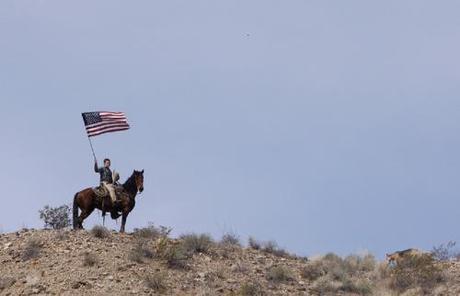 Cliven Bundy’s son, Ammon, at the standoff against the BLM — the Battle of Bunkerville.
Cliven Bundy’s son, Ammon, at the standoff against the BLM — the Battle of Bunkerville.
In his long-standing dispute with the federal government over grazing fees, Nevada rancher Cliven Bundy consistently invokes states’ rights as his principle. From Bundy’s blog of April 21, 2012, stating his position:
…the State of Nevada owns the lands pursuant to their NRS 321.596 et al statutes (Nevada Public Lands Ownership Act) enacted by Nevada back in the late 1970′s. All the western public lands states adopted this law back when it was called the “Sagebrush Rebellion”. The main component of this law (Public Lands Ownership) has yet to be adjudicated by the courts or by the US Supreme Court. This matter came to the forefront once in the court process and the then Nevada Attorney General filed away this issue by stipulating that the feds owned the public lands in Nevada. The court basically said it had no other choice but to rule in favor of the Feds. (US vs. Nye County). Bundy is following Nevada Law and holds that the 18 year old adverse decision against him that the BLM et al is using does not apply to him because he is not grazing on federal property. The State of Nevada has an obligation to enforce its own law on this matter. Therefore Bundy is not in contempt of any court order since he is not operating on federal property.
Bundy paid grazing fees to the rightful Landlord (Clark County-NV) back in the ’90′s and then they returned that payment to Bundy. […] Bundy still has the county check and he never intended to steal anything and stands ready to pay the rightful Landlord today just like he did back in the ’90′s.
The federal government claims ownership of as much as 80% of the land in the State of Nevada. How did that happen?
Martin Armstrong explains on his global financial markets forecasting site, Armstrong Economics, April 19, 2014:
The current land conflict in Nevada extends back to this event in 1864 and how the territory of Nevada became a state in order to push through a political agenda to create a majority vote. [...]
The “law” at the time in 1864 required that for a territory to become a state, the population had to be at least 60,000. At that time, Nevada had only about 40,000 people. So why was Nevada rushed into statehood in violation of the law of the day? When the 1864 Presidential election approached, there were special interests who were seeking to manipulate the elections to ensure Lincoln would win reelection. They needed another Republican congressional delegation that could provide additional votes for the passage of the Thirteenth Amendment to abolish slavery. [...] Nevada’s entry would secure both the election [of Lincoln] and the three-fourths majority needed for the Thirteenth Amendment enactment.
The votes at the end of the day demonstrate that they never needed Nevada. Nonetheless, within the provisions of the Statehood Act of March 21, 1864 that brought Nevada into the voting fold, we see the source of the problem today. This Statehood Act retained the ownership of the land as a territory for the federal government. In return for the Statehood that was really against the law, the new state surrendered any right, title, or claim to the unappropriated public lands lying within Nevada. Moreover, this cannot be altered without the consent of the Feds. [...]
Republican Ronald Reagan had argued for the turnover of the control of such lands to the state and local authorities back in 1980. Clearly, the surrender of all claims to any land for statehood was illegal under the Constitution. This is no different from Russia seizing Crimea. The Supreme Court actually addressed this issue in Pollard’s Lessee v. Hagan, 44 U.S. 212 (1845) when Alabama became a state in 1845.[...]
The Pollard decision expressed a statement of constitutional law in dictum making it very clear that the Feds have no claim over the lands in Nevada. The Supreme Court states:
The United States never held any municipal sovereignty, jurisdiction, or right of soil in and to the territory of which Alabama, or any of the new States, were formed, except for temporary purposes, and to execute the trusts created by the acts of the Virginia and Georgia legislatures, and the deeds of cession executed by them to the United States, and the trust created by the treaty of the 30th April, 1803, with the French Republic ceding Louisiana.
So in other words, once a territory becomes a state, the Fed must surrender all claims to the land as if it were still just a possession or territory.
Sorry, but to all the left-wing commentators who call Bundy a tax-cheat and an outlaw, be careful of what you speak for the Supreme Court has made it clear in 1845 that the Constitution forbids the federal rangers to be out there to begin with for the Feds could not retain ownership of the territory and simultaneously grant state sovereignty. At the very minimum, it became state land – not federal.
~Eowyn

